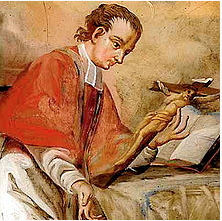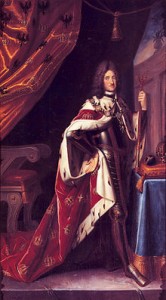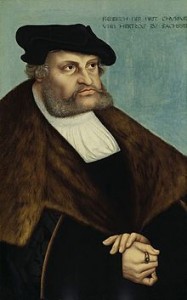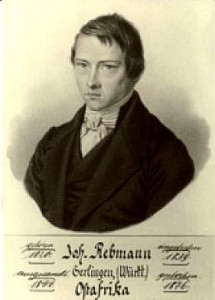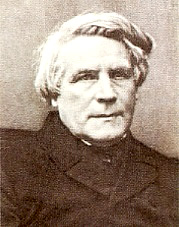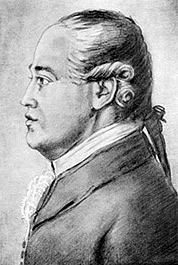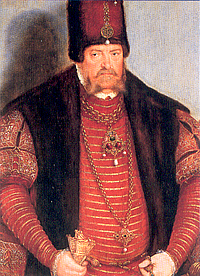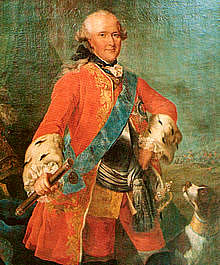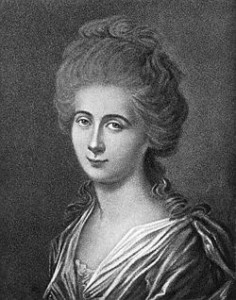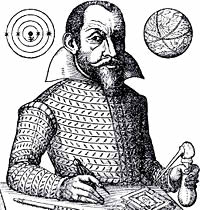January 19 - feast day of St. Agricius von Trier (ca. 260 – ca. 329) Tradition relates that Agricius had been the Patriarch of Antioch and was sent to Trier, Germany by Pope Sylvester at the specific request of St. Helena (mother of the Emperor Constantine the Great, who ruled from Trier). He became the Bishop of Trier. Some legends have it … [Read more...]
January 18 in German History
January 18, 1701 Frederick I of Prussia crowns himself king at Königsberg, Prussia (now Kaliningrad, Russia). Frederick maintained a large, splendid court and an army out of proportion to his territories and position to further his pretensions. In European politics, he allied himself with Austria and the sea powers (England and … [Read more...]
January 17 in German History
January 17, 1463 Birth of Friedrich III (the Wise) (1463-1525), Elector of Saxony, in Torgau, Germany. Friedrich served as the protector of Martin Luther after the imperial ban of 1521. He housed Luther at the Wartburg castle where Luther translated the Bible. Friedrich was a patron of Albrecht Dürer and Lucas Cranach the Elder. He founded … [Read more...]
January 16 in German History
January 16, 1820 Birth of Johannes Rebmann (1820-1876) in Gerlingen, Germany. Rebmann was a missionary and explorer in Africa. In 1848 he was the first European to see Mount Kilimanjaro and in 1849 the first to see Mount Kenya. January 16, 1838 Birth of Franz Brentano (1838-1917) in Marienberg, Germany. Brentano was a professor of … [Read more...]
January 15 in German History
January 15, 1791 Franz Grillparzer born in Vienna, Austria. Grillparzer was one of the leading dramatists of Austrian literary history. Important works by Grillparzer include, Die Ahnfrau (1817), Sappho (1818), Das Goldene Vlies (1821), König Ottokars Glück und Ende (1823), Des Meeres und der Liebe Wellen (1831), and Der Traum ein Leben … [Read more...]
January 14 in German History
January 14, 1683 Birth of Gottfried Silbermann (1683-1753) in Kleinbobritzsch, Germany. Silbermann's company was the leading builder of spinets, clavichords, harpsichords and organs in the age of Bach. January 14, 1800 Birth of Ludwig Ritter von Köchel in Stein, Austria. Although he had earned a doctorate in law, Köchel devoted his … [Read more...]
January 13 in German History
January 13, 1505 Birth of Joachim II Hektor (1505-1571) in Cologne, Germany. Joachim II Hektor was the Elector of Brandenburg at the time of the Reformation. He remained true to the Catholic Church and to the Emperor of the Holy Roman Empire, but he tolerated Protestantism in the areas under his governance. On several occasions he served as … [Read more...]
January 12 in German History
January 12, 1519 Death of Maximilian I in Wels, Austria. Maximilian was the Archduke of Austria, the German king and the Holy Roman Emperor. He did much to expand and consolidate the Habsburg holdings. He nearly became Pope. The Pope, Julius, was very ill and a schismatic Council of Pisa offered Maximilian the position as an anti-Pope. After … [Read more...]
January 11 in German History
January 11, 1753 Birth of Charlotte Buff (1753-1828) in Wetzlar, Germany. She was a close friend of the poet Johann Wolfgang von Goethe in their youth. Goethe fell in love with her but she rejected him and instead married Johann Christian Kestner, a diplomat and art collector. In Goethe's novel The Sorrows of Young Werther, the character of … [Read more...]
January 10 in German History
January 10, 1573 Birth of Simon Marius (1573-1624) in Gunzenhausen, Germany. Marius was the astronomer who named the four largest moons of Jupiter. He was one of the first astronomers to use a telescope, the first to report the spiral nebula in Andromeda and one of the first to note sunspots. January 10, 1785 Death of Heinrich Wilhelm … [Read more...]
- « Previous Page
- 1
- …
- 30
- 31
- 32
- 33
- 34
- …
- 37
- Next Page »
